La Storia di Spazio a, Cagliari
Il Cinestudio Spazio a... viene aperto nel 1976 a Cagliari, da Marilisa Piga, Sandro Dernini, Pietro Zambelli, PierNicola Cocco, Annamaria Pillosu, Sandro Carboni, Paolo Cossu e Emilietta… inizialmente come un cineclub, con sede legale in piazza Martiri 1, associato alla L.I.A.C.A , Lega Italiana Associazioni Culturali Alternative.
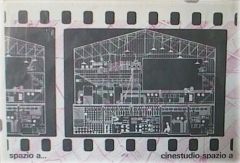
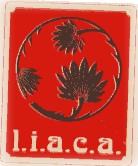
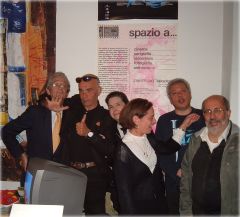
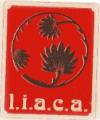
Within the Italian political context of the 70’s, with student protests and Red Brigades, the L.I.A.C.A. had a very active role on defending the constitutional rights of the article 18, of freedom’s expression against the police’s tentative of closing most of all alternative cultural spaces as sites of political dissent.
The L.I.A.C.A. was started in May 1976 Rome by AIACE, Filmstudio, Teatro in Trastevere, l’Occhio L’Orecchio La Bocca, Politecnico, Alberico, Beat 72, La Maddalena, Mago d’Oz, il Sabelli, La Comune, Cento Fiori, L’Officina, il Murales, Zanzibar, then joined by Spazio a..in Cagliari and Cineclub Obraz in Milan, for freedom in association and espression.and played a very important seminal role in the birth of the Roman Summer, a cultural program by the City of Rome, initiated by its Cultural Affairs Commissioner, Renato Nicolini.
In order to raise attention on the lost of freedom of expression, the L.I.A.C.A. in the summer of 1978 staged an outdoor happening in piazza Santa Maria in Trastevere, with many performers, amomg them Domit, Daniela Gara, Romano Rocchi, etc.
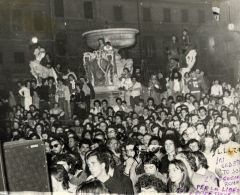
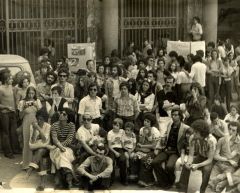
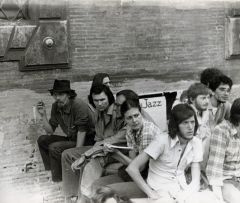
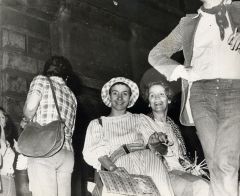
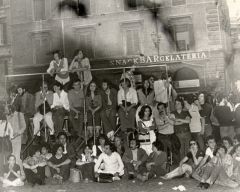
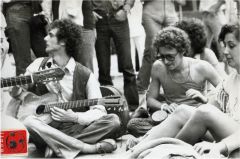
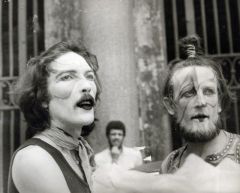
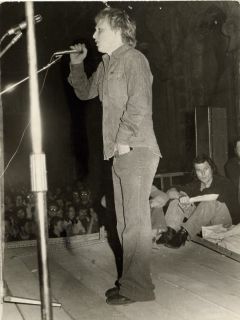 foto Beppe Forli 1978
foto Beppe Forli 1978
In March 1976 in Rome, private clubs and multi-purpose entertainment centers, as well as macrobiotic restaurants run as associations, were under fire from certain articles of law in the infamous Public Safety Consolidated Act. In fact, the police in Naples closed numerous centers for theatrical experimentation and some film clubs guilty of various contraventions and regulations of the aforementioned Act. Following these episodes, there was an initial mobilization of the clubs, and a committee was formed to defend the free activity of cultural associations (also because some signals suggested that a similar offensive might be planned for Rome). The denunciation of this state of affairs took place first at the Filmstudio (March 9), where during a press conference a document was signed that revealed the strategy of the repressive operation: to prevent the strengthening of a circuit of alternative culture and to discourage autonomous organizations that operate in political and economic antithesis to the dominant ideology and commercial structure from their activities. But an organization was needed to coordinate the activity of all alternative cultural associations, representing a permanent organic link between all private associations. Already at the subsequent National Club Conference (March 22, in Mentana), the constitution of this organization was being outlined, but it was only at the end of May that its legal form was clarified. It was in fact established as the Italian League of Alternative Cultural Associations (hence the acronym L.I.A.C.A.), and as its first demonstrative act, it called for a day of protest by all member cultural circles on Sunday, May 30. On that day, in fact, all remained closed, and carried out their activities in Piazza S. Maria in Trastevere, where there was a real "happening", with shows and expressions of solidarity from various personalities from the Roman cultural world.
The period of the League's constitution was followed by a period of calm, but it must be considered that the normal summer truce was approaching. However, LIACA remains ready for any repressive attack aimed at limiting the right of expression deriving from Article 18 of the Constitution and the right to associate freely without authorizations that are not prohibited to individuals by criminal law.
(From Altro Cinema, Year I, n. 5-6 July - September 1976. AIACE information periodical)
- « Previous
- 1



